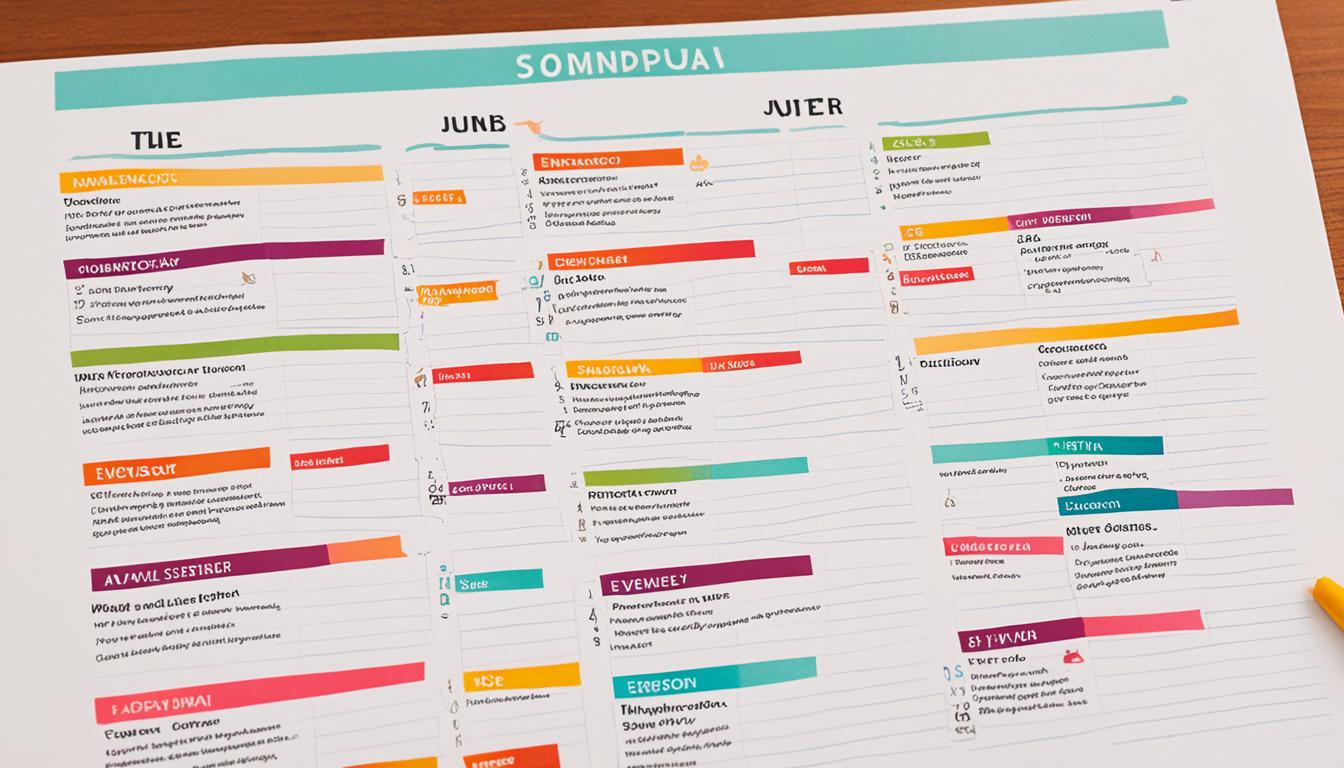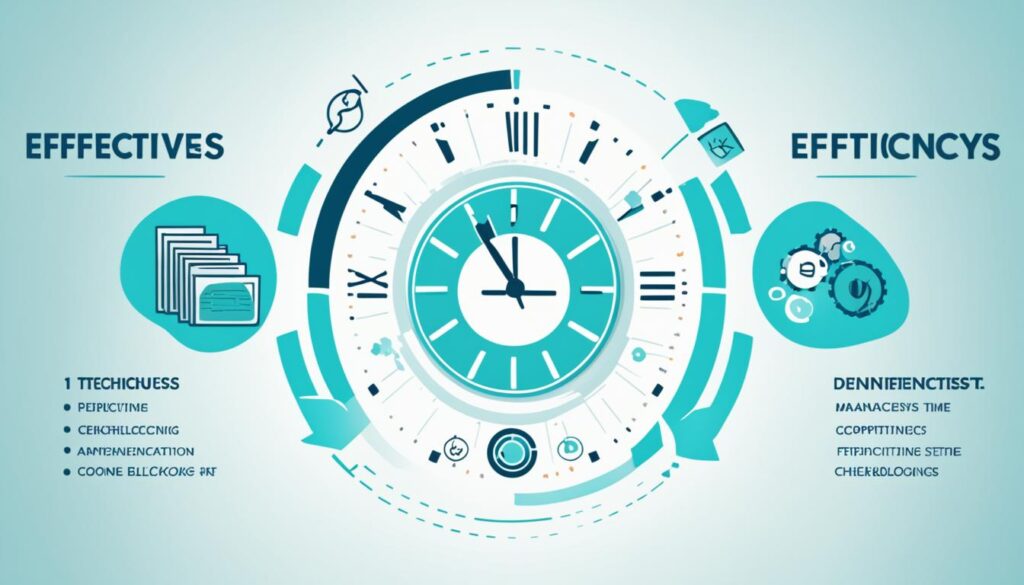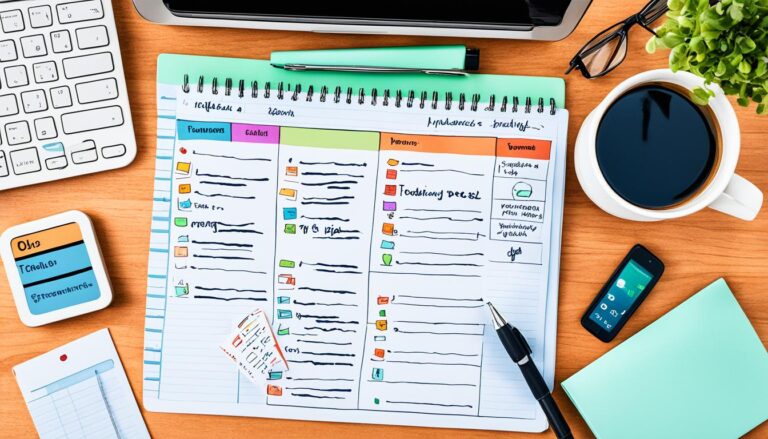Master Your Day: Example of Time Management Excellence

“The key is not to prioritize what’s on your schedule, but to schedule your priorities.” – Stephen Covey
Time management is a critical skill for achieving productivity and success. It allows you to make the most of your limited time and accomplish your goals effectively. By mastering time management, you can optimize your productivity and effectiveness in both personal and professional aspects of your life.
Key Takeaways:
- Effective time management involves prioritizing tasks based on their urgency and importance.
- The Eisenhower Matrix can help assess and prioritize tasks effectively.
- By combining effectiveness and efficiency, you can achieve optimal time management.
- Understanding how you spend your time is crucial for effective time management.
- Setting priorities and scheduling tasks appropriately are key aspects of time management.
The Importance of Time Management
Time management is essential for business owners and individuals alike. It allows you to make the most of the limited time available to you each day. Effective time management helps prioritize tasks, stay focused, and avoid distractions. By implementing time management strategies such as setting goals, planning, prioritizing, and delegating tasks, you can improve your efficiency and achieve better results.
When it comes to managing your time effectively, having a clear understanding of your priorities is crucial. By identifying the most important tasks and focusing on them first, you can ensure that your time is allocated wisely. This not only helps you accomplish your goals but also reduces stress and increases productivity.
One effective time management strategy is setting goals. By defining what you want to achieve, you can create a roadmap for your tasks and activities. Goals provide motivation and direction, keeping you on track and focused. Break down larger goals into smaller, manageable tasks to make them less overwhelming and easier to accomplish.
Another key aspect of time management is planning. By creating a schedule or to-do list, you can organize your tasks and allocate specific time slots for each activity. This helps prevent procrastination and ensures that important tasks are completed in a timely manner. Use time management tools such as calendars, planners, or mobile apps to assist in planning and tracking your progress.
Time management techniques to boost your productivity:
- Set clear and specific goals
- Break down tasks into smaller, manageable steps
- Use a planner or digital calendar to schedule tasks and appointments
- Set deadlines for each task
- Prioritize tasks based on their importance and urgency
- Delegate tasks that can be done by others
- Avoid multitasking and focus on one task at a time
- Eliminate distractions, such as turning off notifications on your phone
- Take regular breaks to recharge and maintain focus
By incorporating these time management strategies into your daily routine, you can optimize your productivity and achieve better work-life balance. Remember, time is a valuable resource that cannot be replenished. Invest your time wisely, and you will reap the benefits of increased efficiency, improved task completion, and reduced stress.

The Two Pillars of Time Management: Effectiveness and Efficiency
Time management is a vital skill that enables you to make the most out of your day. To optimize your productivity and achieve your goals, it is essential to understand the two pillars of time management: effectiveness and efficiency.
Effectiveness focuses on prioritizing tasks and concentrating on the most important activities. By identifying your key objectives and aligning your efforts accordingly, you can maximize the impact of your work. This involves setting clear goals, clarifying expectations, and ensuring that your actions align with your priorities.
Efficiency, on the other hand, is about achieving optimal results with the least amount of wasted time and effort. By streamlining processes, eliminating unnecessary tasks, and leveraging available resources, you can enhance your productivity. It is important to work smarter, not harder.
Combining effectiveness and efficiency allows you to manage your time effectively, ensuring that you are working on the right tasks in the most efficient manner possible. Here are some time management techniques and tips that can help you improve both effectiveness and efficiency:
- Set Priorities: Prioritize your tasks based on their importance and urgency. Focus on high-priority activities that align with your objectives.
- Use Planning Tools: Utilize tools such as calendars, task managers, and project management software to organize your tasks and schedules.
- Get Organized: Maintain a clean and clutter-free workspace to enhance your concentration and minimize distractions.
- Delegate Tasks: Identify tasks that can be delegated to others to free up your time for more critical responsibilities.

Implementing these time management techniques will enable you to manage your time more effectively and efficiently, leading to increased productivity and improved outcomes. By striking a balance between effectiveness and efficiency, you can take control of your time, accomplish more, and achieve your goals.
| Time Management Techniques | Benefits |
|---|---|
| Setting priorities | Prioritize tasks and focus on important activities |
| Using planning tools | Organize tasks and schedules efficiently |
| Getting organized | Create a conducive environment for productivity |
| Delegating tasks | Free up time for critical responsibilities |
Know How You Spend Your Time
Understanding how you spend your time is crucial for effective time management. By keeping a time log, you can gain insights into your daily activities and identify time-consuming tasks. This information allows you to prioritize your tasks and allocate your time more efficiently.
One method to track your time is by using a time tracking app or software. These tools allow you to record the time you spend on different tasks and projects, giving you a clear picture of how you utilize your time. Additionally, they often provide detailed reports and analytics, helping you identify patterns and areas where you can improve.
Another valuable time management tool is the use of to-do lists. A to-do list helps you stay organized by outlining your tasks and deadlines. By breaking down your tasks into smaller, manageable steps, you can tackle them more efficiently and avoid feeling overwhelmed. You can create a to-do list using a simple pen and paper or utilize digital tools such as task management apps.
Furthermore, calendars are an essential time management tool that allows you to schedule and plan your tasks effectively. By utilizing a calendar, you can allocate specific time slots for different activities, ensuring that you have a clear roadmap for your day. It also helps you avoid overcommitting or double-booking yourself.

| Time Management Tools | Description |
|---|---|
| Time Tracking Apps | Helps track and analyze time spent on tasks and projects. |
| To-Do Lists | Organizes tasks and helps prioritize them. |
| Calendars | Allows scheduling and planning of tasks and activities. |
By utilizing time management tools and methods, you can gain a better understanding of how you spend your time and make more informed decisions on how to allocate it efficiently. Whether it’s keeping a time log, using to-do lists, or leveraging calendars, these tools empower you to take control of your time and enhance your productivity.
Set Priorities
When it comes to effective time management, setting priorities is absolutely crucial. By identifying the most important tasks and focusing on them first, you can ensure that you make the best use of your time and achieve better results.
One effective strategy for setting priorities is to distinguish between urgent and important tasks. Urgent tasks are those that require immediate attention, while important tasks are directly aligned with your goals and objectives.
To keep yourself organized and on track, creating a prioritized to-do list can be incredibly helpful. This allows you to visually see which tasks need to be tackled first and helps you stay focused on the most crucial ones. Prioritizing tasks not only ensures that important work gets done, but it also helps you avoid wasting time on less significant activities.
Take a moment at the beginning of each day or week to evaluate your tasks and determine their priority level. Consider the impact and urgency of each task to guide your decision-making process. By setting clear priorities, you’ll be able to allocate your time effectively and work towards your goals with purpose.
Benefits of Setting Priorities:
- Maximize productivity by focusing on high-priority tasks.
- Ensure that important work is completed in a timely manner.
- Reduce stress and overwhelm by breaking down tasks into manageable chunks.
- Improve decision-making and time allocation.
By setting priorities, you become the architect of your own time, ensuring that you dedicate your energy and effort to the tasks that truly matter. Remember, time is a valuable resource, and by prioritizing your tasks, you can make the most of every moment.

| Methods for Setting Priorities | Benefits |
|---|---|
| Create a prioritized to-do list | Keeps you organized and focused on important tasks |
| Rank tasks based on urgency and importance | Helps you allocate time effectively |
| Set deadlines for tasks | Motivates you to complete tasks in a timely manner |
| Delegate non-essential tasks | Frees up your time for higher-priority activities |
Schedule Appropriately
Scheduling plays a vital role in effective time management. By allocating dedicated time for both necessary tasks and activities you enjoy, you can optimize your productivity and achieve a better work-life balance.
One important aspect of scheduling is to identify your most productive and alert times of the day. These are the hours when you can focus and work efficiently, allowing you to tackle the most critical tasks during that time. By aligning your schedule with your energy levels, you can make the most out of the time available to you.
To ensure that important tasks are accomplished, it is essential to block out specific time slots for high-priority activities. During these periods, protect your time from interruptions and distractions as much as possible. By creating a dedicated space for focused work, you can ensure that you make progress on significant tasks that contribute to your goals.
Furthermore, don’t overlook the value of utilizing downtime or waiting time effectively. Scheduling small and less demanding tasks during these moments can maximize your productivity. For example, you can respond to emails or organize your workspace while waiting for a meeting or appointment. By using those pockets of time wisely, you can make progress on tasks and avoid wasting precious minutes.
Delegate and Stop Procrastinating
Effective time management requires mastering the art of delegation and overcoming procrastination. These two strategies can significantly enhance your productivity and help you make the most of your time.
The Power of Delegation
Delegating tasks to others is a key time management technique. It allows you to leverage the skills and abilities of others, freeing up your time for activities that require your expertise. By assigning tasks to capable individuals, you can focus on high-priority activities and maximize your productivity.
Delegation not only saves you time but also empowers your team members, fostering their growth and development. By distributing responsibilities, you create a more efficient workflow and create opportunities for others to contribute to the overall success of the project or organization.
When delegating, it’s important to choose the right person for the task, clearly communicate expectations, and provide the necessary resources and support. Trust in your team’s abilities and embrace the benefits of collaborative effort.
Conquering Procrastination
Procrastination can be a significant hurdle to effective time management. It often stems from feelings of avoidance, dislike, or overwhelm associated with certain tasks. However, overcoming procrastination is essential for optimizing your productivity.
One approach to overcoming procrastination is to tackle challenging tasks head-on. By completing difficult or unpleasant tasks first, you build momentum and confidence, making it easier to tackle the rest of your to-do list.
Breaking down tasks into smaller, more manageable segments can also help combat procrastination. By focusing on one small part of a task at a time, you reduce feelings of overwhelm and increase your motivation to continue working.
Remember to create a conducive environment for productivity, minimize distractions, and set realistic deadlines and milestones to stay on track.
By implementing these time management strategies of delegation and overcoming procrastination, you can optimize your workflow, increase your efficiency, and accomplish more in less time.
Now, let’s explore some practical tips and techniques in the next section to further improve your time management skills.
Conclusion
Time management is the secret to unlocking your full potential and achieving excellence in all aspects of your life. By mastering time management techniques and strategies, you can take control of your schedule, prioritize tasks effectively, and stay focused on what truly matters.
Remember, time management is not about trying to control time itself, but rather about managing your activities in relation to time. It empowers you to make conscious choices about how you spend your valuable hours, minutes, and seconds. By doing so, you can optimize your productivity, reduce stress, and create a harmonious balance between work and personal life.
With dedication and practice, you can become a shining example of time management excellence. Embrace tools such as the Eisenhower Matrix, to-do lists, and calendars to help you stay organized and on track. Set clear priorities, schedule tasks appropriately, and delegate when necessary.
By adopting these time management principles and making them a part of your daily routine, you will unlock your true potential and achieve remarkable results. So, embrace the power of time management and pave the way to a more fulfilling, successful, and balanced life.






